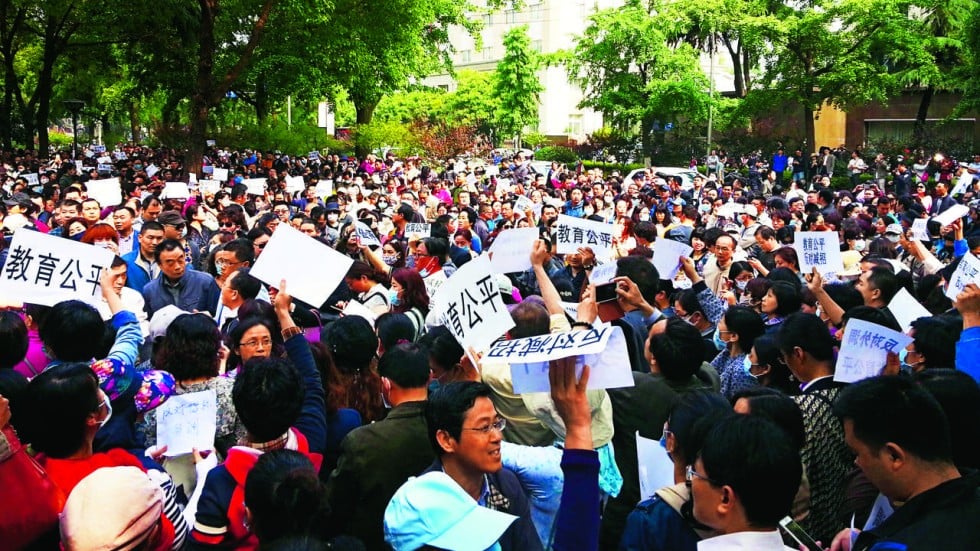Fairness In Education
"The traditional Chinese dream is the hope of advancement for children through a relatively open, meritocratic and egalitarian system."
"Outrage is triggered when there's a perception that this is being challenged."
Carl F. Minzner, professor of law, Fordham University, New York
 |
| South China Morning Post |
But there is a long and honoured tradition in China of rewarding plum positions in government on the basis of merit, where elsewhere, say in Japan for comparison, positions were conventionally and historically granted not on merit but on membership in the aristocracy. The socialist mind appears to have cast itself on the perceived problem of fairness in admissions to university. And the Chinese mind is well recognized for its capacity to learn and develop.
Government officials recently announced a plan to admit students on a larger scale coming from impoverished areas of the country, and consequently fewer would be admitted to local universities if they come from the great burgeoning cities like Nanjing. No doubt rural dwellers rejoice, but those living in the Chinese megalopolises would be far less inclined to, since it means declining opportunities for their offspring.
What is considered "fair" in opening opportunities to the less fortunate, is seen, naturally enough, as "unfair" to the deserving who live in crowded cities. The result has been that parents from about two dozen Chinese cities have launched protests denouncing the government's attempts to expand access to the less socially and economic fortunate. The Communist Party is faced now with a fierce backlash resulting from class conflict.
University admissions process is a cutthroat process at the best of times, a source of stress and concern. Now this additional complication has infuriated parents who see their children's educational prospects dimmed. In China, top schools are located in large, prosperous cities, situated on the coast. Underfunded, less desirable schools are located in the country's interior.
A single national exam, called the gaokao is administered across the country, a test so vital to the fate of a individual many parents prepare their children to write it even before they enter kindergarten. Space at universities is reserved for students coming from a city or province so that applicants from outlying areas find it difficult to be admitted to the best schools. This new initiative was seen as a partial solution, admitting underrepresented regions to top colleges.
A record 140,000 spaces representing roughly 6.5 percent of places in top schools was set aside by the Ministry of Education in the spring for students from provinces that are lesser developed. Because space is not infinite, the ministry informed that schools would be forced to admit fewer local students as a result. In a city a few hours' drive from Beijing parents are angry with government and the urban elite.
"When they need water, land and crops, they come and take it. But they won't let our kids study in Beijing", fumed electrician, 42-year-old Lu Jian. President Xi Jinping now faces a delicate challenge to defend the "China Dream" of fairness in educational opportunities for his vast population. Mr. Xi's government is attempting to ease the frustration in evidence in poorer areas through educational, health care and social services investment.
At the risk of alienating the urban middle class. Hundreds of new institutions of higher education have been installed over the past several decades with university enrolment surging to 26.2 million in 2015 from 1998's 3.4 million. This, even while the economy is now struggling, and job prospects have diminished for college graduates, leaving parents concerned about their life savings being wasted on substandard schools, forcing them to strive to have their children admitted into better ones.
The gaokao is a test that was modelled on the old imperial civil service exam and intended to enhance social mobility, opening universities to anyone who scored high enough to qualify. Universities in Beijing, Shanghai and Nanjing have the reputation of producing graduates most likely to find jobs, while they're the most difficult to get admission into.
"When students from Beijing get into top universities and our students [attending inferior schools, poorly funded and inadequately staffed] fail to do so, some become migrant workers. Who is to blame?", demanded an open letter circulated by parents in Henan Province.
Labels: Academia, China, Crisis Management, Human Relations

<< Home